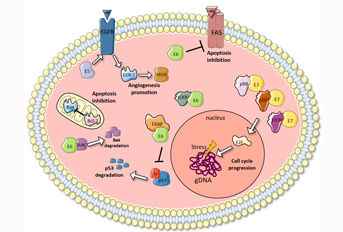Associação Portuguesa de Investigação em Cancro
Cervical cancer and HPV infection: ongoing therapeutic research to counteract the action of E6 and E7 oncoproteins
Cervical cancer and HPV infection: ongoing therapeutic research to counteract the action of E6 and E7 oncoproteins

In the last years, the research team of Ângela Sousa has been focused on the development of biotechnological strategies with therapeutic potential for cervical cancer treatment. The development of this disease is strongly associated with infection by Human Papillomavirus (HPV), being the latter responsible for the production of E6 and E7 oncoproteins. These proteins have the ability of interfering with cellular regulatory mechanisms fueled by tumor suppressor proteins, such as p53 and pRB proteins. Thus, considering the several scientific progresses observed in the last years, it seemed important to perform a bibliographic review regarding the current scenario of the research that has been developed in the biotechnological field towards HPV oncoproteins counteracting for the treatment of cervical cancer. This review, besides contextualizing the reader regarding cervical cancer development and currently available treatments, features DNA vaccines, gene therapy and gene silencing, presenting its advantages and disadvantages.
Authors and Affiliations:
Ana Margarida Almeida, João António Queiroz, Fani Sousa and Ângela Sousa
CICS-UBI - Centro de Investigação em Ciências da Saúde, Universidade da Beira Interior, Av. Infante D. Henrique, 6200-506 Covilhã, Portugal
Abstract:
Cervical cancer is the fourth most common cancer among women worldwide and its development is mainly associated with human papillomavirus infection, a highly sexually transmissible virus. The expression of E6 and E7 viral oncoproteins deregulates cell repairing mechanisms through impairment of tumor suppressor protein functions, such as p53 or retinoblastoma protein. Although the implementation of new preventive vaccines has decreased the infection rate and cervical cancer progression, there are still many women who are affected by this pathology. Nowadays, the main treatment often requires the use of invasive techniques. From well-established strategies, like DNA vaccines and gene therapy, to innovative gene silencing technologies; different methodologies are currently under scrutiny that target the E6 and E7 oncoproteins and/or their modes of action.
Journal: Drug Discovery Today
Link: https://www.sciencedirect.com/science/article/pii/S1359644619303101?via%3Dihub




